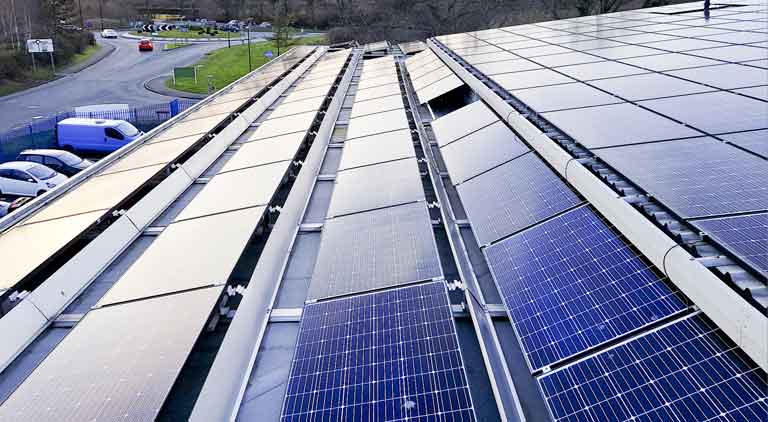Optimising renewable energy for solarised India
By EPR Magazine Editorial March 4, 2020 11:59 am IST
By EPR Magazine Editorial March 4, 2020 11:59 am IST

Solar energy being one of the cheapest sources of power is gaining traction with wide adoption across the world. In the last five years, imports of solar PV cells and modules were about three times the cumulative Foreign Direct Investment (FDI) of India at $4.83 billion that flowed into the entire renewable energy sector.
Technological developments for solar PV
The government’s plan to increase India’s renewable energy generation capacity to 175 GW by 2022 has increased the share of renewable by more than 50 percent in terms of both installed capacity as well as energy generation, in the last five years.
With the ongoing advancements in the renewable sector, Honey Shah, Director, Peco Industries says, “Giving away government subsidiaries and adopting solar by installing solar PV in our surroundings seems to be the only alternative. PV can be maintained and managed by the owner themselves; the government can push for adoption of the same for residential and industrial uses, then it could be pushed up because surely it should be compulsory in the coming time.”
Energy can be saved by installing solar PV modules, for which the solar energy sector has been leveraging technology across various platforms. Evolution of half-cut, mono and PERC cells is prevailing across the industry and is gaining momentum.
Elaborating further on mono and PERC cells, CV Ramanan, Solar Product Unit Head, Thermax Limited says, “PERC cell technology has become pervasive now, and mono cells are also gaining traction. Apart from this, cut cells and bi-facials are gaining traction for their increased efficiency. Module capacity is going up now from what it was earlier. Thus, power density has increased with modern PV technologies.” In terms of new technologies, we are seeing hybrid cells entering the commercial market.
Rooftop solar’s contribution towards electrified India
Rooftop solar is gaining momentum amidst the residential areas attempting to bring down their energy bills, as the power is generated through the sunlight during the day time. Installation cost is one of the major critical aspects, and addressing the same can add to the generation capacity and save the thermal power and vice versa. “It is the most convenient way to generate power individually as each and everyone can contribute to it in a better way and it will be ultimately cheaper too,” believes Shah.
Addressing challenges in the solar energy sector
Net metering policy is one of the major challenges plaguing the sector, in terms of how the power communicates with the grid. Ramanan feels that having more clarity regarding this policy in the medium term would be helpful to solar rooftop players who want to invest in this market and are planning solar projects in the near future. It would give them some certainty about their investments and expected returns. Otherwise, the industry has been open to adopting the latest technologies, which has made operations commercially viable. As solar energy is a commercially affordable form of power, giving reasonably consistent results, we must work on developing it and integrating it with the national grid to allow it to achieve its full potential.
R&D being done for solar PV
Shah says, “Research is an ongoing process while we progressively work. We at Peco are planning to enter the DC MCB segment. We are going for photovoltaic application in products such as DC MCB and surge protection device. They are basic products which are used in solar panels. Maybe in one or two months, we’ll be launching DC MCBs.”
Ramanan shares, “We are engaged in the hybridisation of solar energy with other forms of energy. We operate mainly in the commercial and industrial space, which requires multiple forms of energy from the grid, DG sets, CPP, solar, etc. We are working on optimising these energy forms by choosing the most affordable and reliable source and incorporating hybridisation in our PV projects.”
Market potential foreseen for solar PV
Despite solar being one of the most affordable sources of renewable energy having a huge market potential, solar PV is still a nascent market compared to thermal power. According to Ramanan, this may be because although the proliferation of solar energy has taken place in the last 7-8 years now, the market is plagued by frequent policy changes such as introduction of safeguard duties and GST, inconsistent rooftop solar policies and also by DISCOMs reneging on signed contracts. “These factors pose a challenge in the development of the solar PV segment. However, the yield from solar PV is relatively stable now, so we need to discover ways and means to maximise this energy,” adds Ramanan.
Shah concludes, “We are into solar related production devices and panels. We are planning these products because what we see is the future of solar; everyone wants to save electricity and install solar PV modules. That will create huge demand for solar.”
Module capacity is going up now from what it was earlier. Thus, power density has increased with modern PV technologies.
CV Ramanan, Solar Product Unit Head, Thermax Limited
Solar is highly suggested for a country like India, where demand for electricity is intensifying with the evergrowing population.
Honey Shah, Director, Peco Industries
We use cookies to personalize your experience. By continuing to visit this website you agree to our Terms & Conditions, Privacy Policy and Cookie Policy.